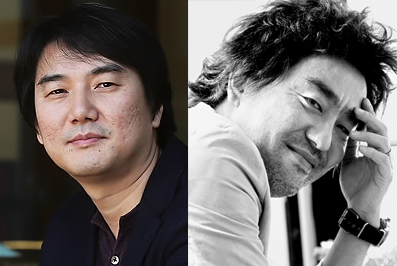The following interview took place at the Korean Cultural Centre UK on Saturday November 10th 2012 prior to a special screening of director Choo Chang-min's film 'Masquerade' - the Closing Gala of the London Korean Film Festival 2012, at the Odeon West End, Leicester Square, London.
Please Note: The following interview was a single ten-minute slot with both Choo Chang-min and Ryoo Seung-ryong (together) and is therefore slightly shorter than the majority of the other interviews that can be found in the 'Interviews' section of the site. As a result of time constraints several of the questions are asked to both director Choo and Actor Ryoo. I hope it will be worth reading, nonetheless.
Interview:
Hangul Celluloid: You’re both here promoting ‘Masquerade’ which is screening at the Closing Gala of the London Korean Film Festival 2012. [To director Choo Chang-min] What drew you to make a period drama when all of your previous films are based on present-day, contemporary stories, and [to actor Ryoo Seung-ryong] what drew to want to star in the film?
Choo Chang-min: As a director, to be able to make a period drama enable you to create something very beautiful as well as realise it in various ways, and hopefully imaginative ways. So, when I was given the script there were basically two reasons why I decided to go ahead with the project: Firstly, the fact that it was a period piece and secondly the appeal of the story.
Ryoo-seung-ryong: The story, although it is set in the far distance past, can be applied to modern day life and modern society and I truly believe that the issues the films details resonate with audiences. I felt that being offered a part in this exceedingly excellent script was a huge honour and I jumped at the chance to say yes and become involved in the project.
Hangul Celluloid: [To both Choo Chang-min and Ryoo Seung-ryong] Shim Eun-kyung is a lesser known actress than either Lee Byung-hun or Ryoo Seung-ryong and her role is ‘Masquerade’ if a much smaller, supporting one but her performance is nonetheless memorable, emotional and nuanced throughout. Do you feel that these smaller roles played by lesser known actors and actresses are necessary to the success of the larger roles of well known names?
Choo Chang-min: As a director, when I was casting ‘Masquerade’, I made a concerted effort to find the balance that you mentioned. So, I deliberately gave the biggest, most in-depth role to Lee Byung-hun and cast Ryoo Seung-ryong in the role that would allow the main character adequate support. However, it was a deliberate decision to give smaller supporting roles to lesser known actors, including Shim Eun-kyung, because I wanted the balance of cast to almost mirror the balance of power within the story itself, and I do have to say that I agree that Shim Eun-kyung’s performance was everything I could have asked for and more. In general, I would say that while there are actually a lot of good male actors around, it’s not as evident that there are that many good new female actors in comparison.
Ryoo-seung-min: Because we live in a capitalist society, I feel it really would be a case-by-case example and somewhat different for each film. However, I do believe that if you have a very well known actor and an extremely good script, you can have a synergy effect that produces something magical and, likely, successful. While that is the case with many films, there are also examples of films that really require a totally new, unknown face, so I feel the balance is within Korean cinema as a whole rather than being within a particular film.
Hangul Celluloid: [To Choo Chang-min] With as visually stunning a film as ‘Masquerade’ is, did you face any constraints, financial or otherwise, from investors or film companies in realising the film as you envisioned it to be?
Choo Chang-min: Thankfully, form the moment I received the script I was given full artistic control and had no constraints or impediments placed between me and creating the film as I wanted to make it. My ultimate intention in making ‘Masquerade’ was to capture an old-fashioned aesthetic beauty which I hope I successfully achieved.
Hangul Celluloid: [To Ryoo Seung-ryong] You have played numerous roles in numerous films; some straightforward dramas; some incredibly physical roles. Was playing your role in ‘Masquerade’ easier than some of those films requiring physicality or did it present difficulties of its own?
Ryoo Seung-ryong: Every role has its own difficulties and while some are very noticeable, as you mentioned discussing physical roles, others are almost imperceptible but are difficulties nonetheless. In the case of ‘Masquerade’, the large amounts of make-up and having to prepare my hair in a specific way were perhaps the hardest parts. It may sound like I’m mentioning something inconsequential but as I mention it even now it must have been an issue [Ryoo Seung-ryong laughs].
Hangul Celluloid: Thank you for taking the time to talk to me.
I would sincerely like to thank the London Korean Film Festival and the Korean Cultural Centre UK for allowing me to interview Choo Chang-min and Ryoo Seung-ryong |


